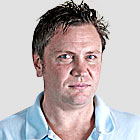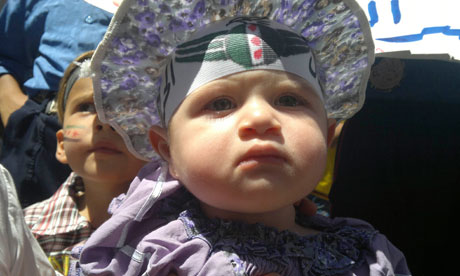
A village 4 kilometres from Turkey has become the key hub of arms shipments and defectors joining the Free #Syria Armyhttp://www.guardian.co.uk/world/2012/jun/29/syria-turkey-border-arms-defectors?newsfeed=true
At Syria's border, after months of waiting, the weapons arrive
A village four kilometres from Turkey has become the key hub of arms shipments and defectors joining the Free Syria Army

- Martin Chulov in northern Syria
- guardian.co.uk,

A baby wearing the logo of the Free Syria Army during a protest against President Bashar al-Assad after Friday prayers. Photograph: Reuters
The guerillas of northern Syria are waiting for another special delivery. When it comes, any day now, it will make the same journey as the two previous shipments that have made their way here, across crop fields worn brown by the sun, up a steep and ragged concrete road and into a decrepit police station that is fast becoming one of the Syrian revolution's most important clearing houses.
Here in this tiny village, men from all over the country have sought refuge. Some have stayed just long enough to be fed and watered before making the last leg of their journey to the safety of Turkey. Others have made this town of 5,000 home, arriving with their families and military weapons that they donated to the rebel cause.
Until last month, scrimping and scrounging weapons from defectors was the only way to resupply a tired and outgunned rebel army. But that changed in May, something the guerilla leadership readily acknowledges.
"True the weapons came," said one Free Syria Army commander, Abdul-Rahman Hallak, sitting in the old police station's meeting room. "There have been around 5,000. That's true too. But it is not enough to win a war."
With the arrival of the weapons, this unlikely town's importance as a hub has only increased. The nearest regime forces are more than 12 kilometres away and have not dared to enter since November. On the other side, the four kilometres to Turkey is a haven of olive groves and potato fields – ideal backdrop for smuggling runs. The 16 kilometre stretch is a buffer zone in all but name; the weapons that are now making their way here cannot possibly do so without Turkish consent.
Defectors now know that this town is their quickest way to safety and have been flocking here from around Syria in large numbers.
"Every day we are getting around 20 coming through here," said Hallak. "Yesterday there were 24. They are coming from all over Syria."
Many of the defectors bring with them evidence of the crimes of the units they had worked with. A large number who come through here are officers, who know they will be respectfully received by the Turkish army across the way and will likely avoid the refugee camps that dot the border areas and act as home to nearly 15,000 Syrians.
Before the officers leave they habitually offload videos from their mobiles, which are downloaded by a computer-savvy member of the FSA and soon uploaded to the opposition network of thousands of videos that have chronicled the horrors of the past 16 months.
One video dropped off last month depicted a scene of unimaginable horror. A man in military uniform stood above two bound men with a chainsaw. He taunted them about their imminent death and said their only God was Syrian president Bashar al-Assad.
Then he put the chainsaw to work, decapitating one man in a series of strokes, his blood splattering the traumatised man next to him as he waited his fate.
"They are criminals, monsters," said one of the rebels in the room as the video was played. "How can anyone do that to another human being?"
With the Turkish army now deployed near the southern border in force a week after one of its warplanes was downed by Syrian air defences, rebels in the area are feeling safer than they have for many months.
Some seemed proud for their village to be named, others encouraged prudence; despite the respite that most people feel here, the never-ending stories of new arrivals keep the brutality of war close to home.
The focus now for the war-weary FSA is what is coming in from Turkey.
Weapons are not the only new arrivals. The rebels acknowledged that three days ago an American man, believed to be a government employee, passed through. He had first been shown around a nearby refugee camp and was brought into Syria by rebels who are not from here; his destination unknown.
The rebels, however, disavow any knowledge though of other foreigners, particularly Arab nationals who are reputed to be entering Syria in increasing numbers as the war grinds on. Early on Friday morning, the Guardian witnessed three Libyan men and two Gulf state nationals arrive in the southern Turkish province of Hatay on a flight from Istanbul.
Two of the new arrivals were carrying backpacks and provisions, but it was not clear if they were planning to join an insurgency across the border.
"It is possible that they could be fighters wanting to help us," said Hallak. "But al-Qaida is not welcome here and everybody knows it. Their ideology is not accepted and their help will be refused. But I swear by God that nobody like that has dared pass through here."
As the men prepare for the next shipment of guns and ammunition – which is widely believed to be organised, by Saudi Arabia and Qatar, which it is understood sent the first two – they rattle off a shopping list.
One walks to another room to fetch an automatic weapon that was delivered in May. "Can this stop a tank?" Hallak asked rhetorically. "No way."
He added: "Can an RPG (rocket-propelled grenade)? Maybe. But we need anti-tank rockets. We need heavier weapons. Hopefully they will be delivered. They will really make a difference."

